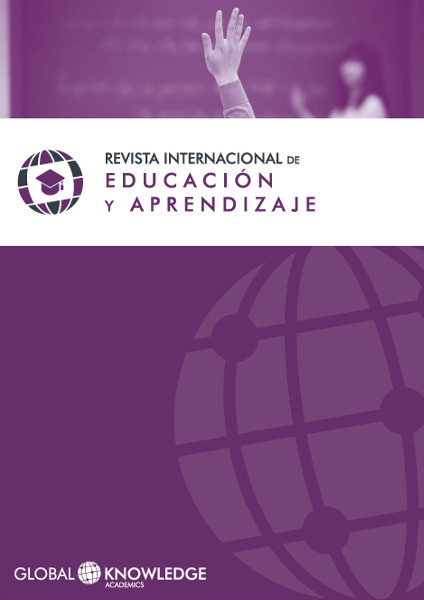Determinantes motivacionales asociados con el desempeño académico en estudiantes universitarios
DOI:
https://doi.org/10.37467/gka-revedu.v5.1610Palabras clave:
motivación, motivación de logro, esfuerzo, aprendizaje, desempeño académicoResumen
La investigación permite conocer los factores motivacionales que favorecen el estudio y las características motivacionales que se relacionan con el desempeño académico de estudiantes universitarios. Se empleó una versión adaptada de la Escala Atribucional de Motivación de Logro de Manassero y Vásquez (1998) que mide la motivación de logro, de esfuerzo e interés, aprendizaje y motivación por parte del docente. Los resultados muestran que los alumnos ponen empeño por sobresalir y sienten satisfacción en el logro de sus propósitos. Finalmente docente no influye en su compromiso por asistir a clase, sino más bien, su propia motivación hacia el estudio.
Descargas
Estadísticas globales ℹ️
|
1054
Visualizaciones
|
495
Descargas
|
|
1549
Total
|
|
Citas
Montico, S. (2004) “La motivación en el aula universitaria: ¿una necesidad pedagógica?”, Ciencia, Docencia y Tecnología, vol. XV, núm. 29, pp. 105-112, en: http://www.revistacdyt.uner.edu.ar/pdfs/Cdt29_Montico.pdf (consulta: 2 de marzo de 2015).
Aréchiga, C., Arellano, D y Tapia, C. (2012), “Motivación al logro en estudiantes universitarios de Guaymas, Sonora: un estudio descriptivo”, en Mario Alberto Vázquez García, Martha Alejandrina Zavala Guirado, Juana María Luisa García Muela y Leda Escobar Quiroz (Coords.), Desde el Tetakawi, La Sociedad del Conocimiento, México, Instituto Tecnológico de Sonora, pp. 96-106.
Alcántara, L. y Bernal, S. (2012), “El aprendizaje autorregulado y su relación con la motivación en estudiantes universitarios”, DIDAC, núm. 59, pp. 4-10, en: http://www.uia.mx/web/files/didac/59.pdf (consulta: 23 de marzo de 2015).
Bravo, A., González, D. y Maytorena, M. (2009), “Motivación de logro en situaciones de éxito y fracaso académico de estudiantes universitarios”, ponencia presentada en el “X Congreso Nacional De Investigación Educativa”, México, Consejo Mexicano de Investigación Educativa, 21-25 de septiembre de 2009, en: http://www.comie.org.mx/congreso/memoriaelectronica/v10/pdf/area_tematica_01/ponencias/0762-F.pdf (consulta: 30 de marzo de 2015).
Rincón, S. (2012), “La transformación del núcleo pedagógico como fuente de motivación docente en escuelas”, DIDAC, núm.59, pp. 30-36, en http://www.uia.mx/web/files/didac/59.pdf (Abril, 2015)
Fernández, M., Mijares, B. y Álvarez, J. (2013), “Motivación hacia el estudio en estudiantes universitarios de nuevo ingreso”, Negotium, vol. 8, núm. 24, pp. 181-195, en: http://www.redalyc.org/articulo.oa?id=78226638008 (consulta: 10 de abril de 2015).
Durán, E. y Pujol, L. (2013), “Escala Atribucional de Motivación de Logro General (EAML-G) Adaptación y análisis de sus propiedades psicometricas”. Estudios Pedagógicos, Vol. XXXIX, núm. 1, pp. 83 -97, en: http://mingaonline.uach.cl/scielo.php?pid=S0718-07052013000100005&script=sci_arttext (consulta: 2 de mayo de 2015). DOI: https://doi.org/10.4067/S0718-07052013000100005
Chaparro, V. (2014), Factores que influyen en el rendimiento académico de los estudiantes deportistas de alto rendimiento, Tesis de Licenciatura, Cd. Obregón, Instituto Tecnológico de Sonora (México).
Cuevas. O., García, R. y Cruz, I. (2008), “Evaluación de una plataforma para la gestión del aprendizaje utilizada en cursos presenciales en el Instituto Tecnológico de Sonora”, Revista Mexicana de Investigación Educativa, vol. 13, núm. 39, pp. 1085-1107 en: http://www.scielo.org.mx/scielo.php?pid=S140566662008000400004&script=sci_arttext (consulta: 3 de mayo de 2015).
Manassero, M. Antonia y Vázquez, A. (1998), “Validación de una escala de motivación de logro”, Psicothema, vol. 10, núm. 2, pp. 333-351, en http://www.psicothema.com/pdf/169.pdf (consulta: 25 de marzo de 2015).
Morales, P. (2006), Medición de actitudes en psicología y educación: Construcción de escalas y problemas metodológicos, Madrid, España, Univ Pontifica Comillas.
Arias, J (2002), “Perspectivas recientes en el estudio de la motivación: La teoría de la orientación de la meta”; Escritos de pedagogía, núm. 6, pp. 72-84, en http://www.escritosdepsicologia.es/descargas/revistas/num6/escritospsicologia6_revision2.pdf, (Consultado: 21 de febrero de 2015).
Bautista, G., Borges, F. y Forés, A. (2006), Didáctica Universitaria en entornos virtuales de enseñanza-aprendizaje, Madrid, Narcea.
Rodríguez, F. y Torrado, M. (2003), “El rendimiento académico en la transición secundaria-universidad”, Revista de Educación, núm. 334, pp. 391-414.
Beltrán, J. y Bueno, J. (Eds.) (1995), Psicología de la educación, Barcelona España, Boixareu Universitaria y Marcombo.
Lieury, A. y Fenouillet, F. (2012), Motivación y Exito escolar, España, Fondo de Cultura Económica.
Kelly, W. (1982), Psicología de la educación, Wisconsin, USA, Ediciones Morata.
Pila, J. (2012), La motivación como estrategia de aprendizaje en el desarrollo de competencias comunicativas de los estudiantes, Tesis de Maestría, Universidad de Guayaquil (Ecuador), en http://repositorio.ug.edu.ec/bitstream/redug/1659/1/TESIS%20COMPLETA%20DE%20MOTIVACION.pdf ( 18 de octubre de 215).
Sanchez, M. (2010), Técnicas docentes y sistemas de evaluación en educación superior, Madrid, España, Narcea Ediciones.
Escaño, J. y Gil, M. (2001), “Motivar a los alumnos y enseñarles a motivarse”, Aula de Inoovación Educativa, núm. 101, pp. 84, en: http://www.grao.com/revistas/aula/101-motivacion-escolar/motivar-a-los-alumnos-y-ensenarles-a-motivarse (consulta: 3 de abril de 2015).
Descargas
Publicado
Cómo citar
Número
Sección
Licencia
Los autores/as que publiquen en esta revista aceptan las siguientes condiciones:
- Los autores/as conservan los derechos de autor.
- Los autores/as ceden a la revista el derecho de la primera publicación. La revista también posee los derechos de edición.
- Todos los contenidos publicados se regulan mediante una Licencia Atribución/Reconocimiento-SinDerivados 4.0 Internacional. Acceda a la versión informativa y texto legal de la licencia. En virtud de ello, se permite a terceros utilizar lo publicado siempre que mencionen la autoría del trabajo y a la primera publicación en esta revista. Si transforma el material, no podrá distribuir el trabajo modificado.
- Los autores/as pueden realizar otros acuerdos contractuales independientes y adicionales para la distribución no exclusiva de la versión del artículo publicado en esta revista (p. ej., incluirlo en un repositorio institucional o publicarlo en un libro) siempre que indiquen claramente que el trabajo se publicó por primera vez en esta revista.
- Se permite y recomienda a los autores/as a publicar su trabajo en Internet (por ejemplo en páginas institucionales o personales), una vez publicado en la revista y citando a la misma ya que puede conducir a intercambios productivos y a una mayor y más rápida difusión del trabajo publicado (vea The Effect of Open Access).













